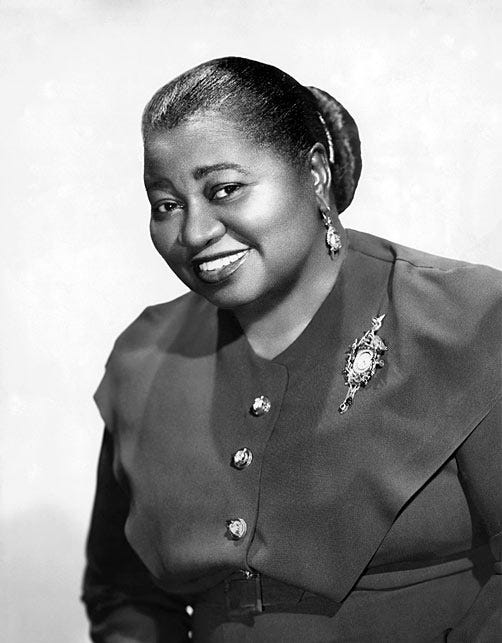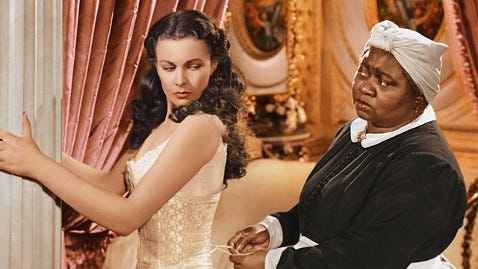Lots of times something will trigger a memory, and I just have to write about it even if nobody reads it. That’s why I’m writing about Hattie McDaniel, a Black actress whose heyday was in the 1930s. I think anyone who’s watched some old movies would recognize her. She played the Black stereotypical Mammy, dark skinned, overweight, nurturing and devoted to her white family for whom she works as a maid and a caregiver.
Hattie McDaniel was the youngest of 13 children. She was born in Wichita, Kansas, on June 10, 1893. Both her parents had been slaves. In 1901 the family moved to Denver, Colorado. There she enjoyed singing in church and school. Eventually while still in Denver, she began playing in minstrels where she developed her talents as a comedian, singer, dancer, and actor.
*In the 1920s, Hattie worked with Professor George Morrison’s orchestra and toured with his and other vaudeville troops for several years. By mid-decade, she was invited to perform on Denver’s KOA radio station.
Following her radio performance, McDaniel continued to work the vaudeville circuit and established herself as a blues artist, writing her own work. When projects weren’t coming in, she took on attendant work to supplement her income. Much to her relief, in 1929, she landed a steady gig as a vocalist at Sam Pick’s Suburban Inn in Milwaukee.* from Biography.com
In the 1930s Hattie McDaniel moved to Los Angeles. She was able to get small acting roles from time to time, but roles for Black actresses were hard to come by. She landed in “Judge Priest” starring Will Rogers in 1934 and in 1935 she was awarded the role of Mom Beck, starring opposite Shirley Temple and Lionel Barrymore in “The Little Colonel.” Both of these roles were stereotypical Mammy characters.
Hattie McDaniel began receiving very harsh criticism from the Black population for perpetuating the Black Mammy stereotype. Hattie had another view. She believed that with the right acting approach to these parts people would come to realize that African American actors were capable of much more and different parts would come. She got the chance to prove that with her biggest part of her life. She was cast in 1939’s “Gone with the Wind” opposite Vivien Leigh as Scarlett O'Hara, Clark Gable as Rhett Butler, Leslie Howard as Ashley Wilkes, and Olivia de Havilland as Melanie Hamilton. And Hattie McDaniel as Mammy.
During the premiere of "Gone with the Wind" at the Loew's Grand Theatre in Atlanta, Georgia, on December 15, 1939, there were protests and pickets by some members of the Black community who viewed the film as a negative portrayal of African Americans and a "weapon of terror against black America." Due to segregation none of the Black cast members were invited to attend. The movie was a box office success, and for her portrayal of Mammy, Hattie McDaniel was nominated by the Academy of Motion Picture Arts and Sciences for Best Supporting Actress.
And she won, becoming the first African American to win an academy award.
She had been vilified by the Black press relentlessly since she played Mom Beck in “The Little Colonel.” She thought that she had brought honor to the black community with her Oscar, but the criticism only worsened as Walter White, then head of the NAACP implored Black actors not to accept stereotypical roles that degraded the African American community. He challenged movie studios to start showing African Americans as capable of achieving far more than cooking and cleaning for white people.
Hattie McDaniel said she would not be told what parts she could or couldn’t play.
After “Gone with the Wind,” though, Hattie’s career started to slide. She still only had stereotypical parts to go back to. Other parts weren’t going to come along. So she took the part of a Black maid named Beulah on “The Beulah Show” in 1947.
When the series moved to television in 1951 she continued in the role of Beulah. Unfortunately she only filmed one episode when she had a heart attack. She was then diagnosed with breast cancer. Hattie McDaniel died on October 26, 1952. She was 57 years old.
After her death, the groundbreaking actor was posthumously awarded two stars on the Hollywood Walk of Fame. She was inducted into the Black Filmmakers Hall of Fame in 1975 and honored with a commemorative U.S. postage stamp in 2006. From biography.com
At the Academy Awards held at the Coconut Grove of the Ambassador Hotel on Thursday, February 29, 1940, Hattie McDaniel who was not allowed to sit with the others because of her color, gave a gracious acceptance speech. The members of the Academy were clearly moved. Following is that moment.






Thank you for this history. I knew Ms. McDaniel won the award, in a time of rigid segregation. I was astonished when I learned that. How weird to be honored with the award, yet not be allowed to sit in the white audience. The South tries to hold onto its racist history even now, almost a hundred years after this ceremony. And despite Civil Rights laws and de-segregation. What a truly sad and ignorant disgrace, that we still have to fight for all people's belonging to humanity.
Another of Ms McDaniels roles is in the 1944 weepie "Since You Went Away." It's one of my favorites, and one that I watch every year at Christmas, because the last scenes are on Christmas Eve and I need an excuse to bawl my eyes out. 😂 McDaniel plays Fidelia, the stalwart housekeeper of the Hilton family, whose paterfamilias has enlisted and gone off to war. Claudette Colbert plays Mrs Hilton, and the two daughters of the family are played by Jennifer Jones and a teenage Shirley Temple in one of the few roles she had past her childhood. Joseph Cotten, Monty Woolley, and Agnes Moorehead round out the cast.
It is easy to pick apart the motivations of the screenwriter for this film. The Hiltons can't afford to keep a maid with Mr Hilton gone into the military, so Fidelia takes a job with friends of the Hiltons (whom she describes as 'lofty people uptown') but does not want to live in their house because she doesn't like the other servants. So she asks Mrs Hilton to rent her her former room in the Hilton household. Mrs Hilton, of course, will hear nothing of accepting money from Fidelia, so Fidelia tells her that she will work nights and weekends for the Hiltons in recompense for the room. Mrs Hilton, of course, will hear nothing of this, since it will be wonderful just having Fidelia in the house.
In the next scene, Fidelia is working her ass off as usual. The other scenes in the remainder of the film make It obvious that she is in the Hilton's home as a servant. The Hiltons love her, particularly the daughters who were raised by her, but her primary worth is as a maid.
Despite all this, I still love the movie, and I felt great empathy for Ms McDaniel's position when I read an interview in which she stated that she'd rather play a maid for $700 a week then be a maid for $7 a week. More power to her.
However, you must remember that I'm the girl who came home from seeing "Mary Poppins" as a child and informing my mother that the only reason Mrs Banks and her friends had time to picket and chain themselves to the prime minister's fence and so on as part of their votes for women activism, is that they had nannies and maids back home doing the shit work. 😂 I like to hope that's part of what became my ardent feminism.